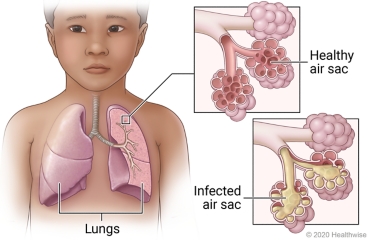Walking Pneumonia in Children: Care Instructions
Your Care Instructions

Walking pneumonia is an infection of the lungs caused by the mycoplasma bacteria. This form of pneumonia is
usually mild and feels like a chest cold, but it can get worse. The symptoms of cough, headache, and a low
fever start slowly. The infection is usually so mild that your child may walk around with it without knowing
they have it. Most children don't get sick enough to be in the hospital. It is more common in younger people.
Walking pneumonia is usually treated with antibiotics.
Your child's cough may last for a few weeks after the infection has been treated. They may have some wheezing
too. These symptoms will go away over time.
Follow-up care is a key part of your child's treatment and safety. Be sure to make and go to all
appointments, and call your doctor if your child is having problems. It's also a good idea to know your
child's test results and keep a list of the medicines your child takes.
How can you care for your child at home?
-
Be safe with medicines. Call your doctor if you think your child is having a problem with the medicines.
-
If the doctor prescribed antibiotics for your child, give them as directed. Do not stop using them just
because your child feels better. Your child needs to take the full course of antibiotics.
-
Ask your doctor if you can give your child acetaminophen (Tylenol) or ibuprofen (Advil, Motrin) for fever
or fussiness. Read and follow all instructions on the label. Do not give aspirin to anyone younger than 20.
It has been linked to Reye syndrome, a serious illness.
-
Be careful with cough and cold medicines. Don't give them to children younger than 6, because they don't
work for children that age and can even be harmful. For children 6 and older, always follow all the
instructions carefully. Make sure you know how much medicine to give and how long to use it. And use the
dosing device if one is included.
-
Make sure your child rests. Keep your child at home if they have a fever.
-
Keep your child away from smoke. Do not smoke or allow anyone else to smoke in your house.
When should you call for help?
 Call 911
anytime you think your child may need emergency care. For example, call if:
Call 911
anytime you think your child may need emergency care. For example, call if:
Call your doctor now or seek immediate medical care if:
Watch closely for changes in your child's health, and be sure to contact your doctor if:
Current as of: June 12, 2023
Content Version: 14.0
Care instructions adapted under license by your
healthcare professional. If you have questions about a medical condition or this instruction, always ask
your healthcare professional. Healthwise, Incorporated disclaims any warranty or liability for your use of
this information.